|
|
Main
November 1, 2008
Final Thoughts on Baseball
I didn't have a chance to see much baseball this year. I was otherwise occupied for most of the year. But usually, there's just nothing like post-season baseball.
This year, there wasn't much point. Aside from the Red Sox-Rays Game 7, there was almost no drama. And baseball's ownership is rapidly relegatinig its sport's biggest moments to irrelevance, obscurity, and ridicule. Their biggest games are virtually unwatchable - taking place too late in the day and too late at night.
In the past few years, we have seen a tied All-Star Game, the first postponed game in World Series history, and the last World Series Game 7 was 6 years ago, the longest drought of a decisive winner-take-all game since 1913-1923. The games start late by Mountain time standards. I had to think - hard - to remember who the Phillies beat in the divisional playoffs. And they re-scheduled the World Series so a potential Game 7 wouldn't have to go up against a regular season NFL game on a Sunday night.
If they don't shorten the schedule and shorten the games, they're going to turn MLB into the NHL, and it'll happen sooner than we think.
October 29, 2007
Wait Till Next Year!
OK, so the 2007 Rockies didn't turn out to be the 1996 Yankees, after all. You look for hope where it may lie, and in the case of the Rockies, there was hope pretty much until the final out. The Red Sox were the better team, and having won two Series in four years, verge on becoming Oceania to the Yankees' East Asia. Or Eurasia, depending on the year.
Losing the Series clearly diminishes what could have happened, but not what actually happened. I skipped out of the San Diego game feel good. I sprinted out of the LCS Game 4 feeling >great. I don't care if the whole world knows that we cheer, "From the Mountains..." It's no worse that Baltimore shouting "O" during the national anthem.
The Montforts, for all the grief they've earned and gotten, have done two things incredibly right. First, the Humidor(tm), meant that the Rockies were playing roughly the same game as the rest of the National League. The field may be bigger, but at least you don't have to carry 15 pitchers.
Second, they developed an organization rather than renting a trophy. The Yankees built their dynasty mostly on h ome-grown talent. The Orioles won all those pennants with a farm system. Both teams, once they started relying on spending, spending, spending, stopped winning winning winning.
There are people here - and I'm among them - who for the first time really can't wait to see what the Spring brings for this team.
So don't blow it.
This doesn't mean the Rockies have to win 96 games and the Series next year, though that would be nice. It does mean that the team has to make the transition from re-building to improving. That's a tough transition. The move from 80 wins to 90 wins is nothing compared to the move from 90 to 95, or even from the Wild Card to Division Winner. History says that most teams decline after a jump like this, especially one built on a streak rather than consistent, year-long performance.
Management will be tempted to over-rate itself. It may find it hard to irritate its new fans by dropping or benching players that became heroes in the last three weeks. Do it anyway. It may find it expensive to take care of the nucleus of the team. Do it anyway. It may find it disagreeable to hold the line on ticket prices. Do it anyway. It may really hurt to start looking for a new manager...
Hey, it's only 105 days until pitchers and catchers report.
October 25, 2007
Live Long Enough, You See Everything Twice
The eventual pennant winner came from 3-1 down, scoring over 30 in games 5,6 and 7, while holding the opposition to single digits. They had won 96 games in the regular season, were perennial playoff occupants, had won the Series recently, and had much of their team intact.
In the other league, the pennant winner had breezed through its playoffs, aided by a controversial call against a division rival in the LCS. Few of the games were blowouts, but the series as a whole weren't close. It was a team whose stars were largely home-grown, who had a young, dominating closer. a rookie shortstop who seemed destined for greatness, and a first baseman who had been waitng for postseason glory for a while.
In Game 1, the team on a roll, whose bats were hot, crushing its opponents, cruised to a 12-1 win. They won Game 2, also. Then, the other team, whose manager had proclaimed, "They've got us right where we want 'em," swept the next four to win its first World Series.
Well, its first World Series in 18 years. It was 1996, and the Jeffrey Mayer-aided New York Leyritzes came back to stun the Braves. The Braves had themselves come back from 3-1 down, shredding the Cardinals 14-0, 3-1, and 15-0.
So, are the 2007 Rockies the 1996 Yankees? Well, in 1996, the Yankees weren't the Yankees yet, either. It wasn't a team loaded with All-Stars and Hall of Famers, though there were a few.
As long as the 2007 Red Sox look like the 1996 Braves, there's a chance.
October 19, 2007
Business and Baseball
So Manny Ramirez doesn't think it's the end of the world if the Bosox don't win the pennant this year. As usual, Manny's a little, what, isolated? out-of-step? oblivious? to the desires of the Red Sox nation. So yesterday, Mike Greenberg explained that fans want their players to care as much as they do, especially if they're making more in a year than most will make in a lifetime. And Mike Golic explained that it just doesn't work that way, that it's a job, and that getting paid more doesn't make you care more. We've heard it all before.
Then Greenberg said something like the following, and I'm paraphrasing:
Fans forget that for people inside sports, it really is all about the money. Sports is the only industry where what the customers want has nothing to do with what the owners want. Owners and players want to make money, while the fans want to win. Take our company, Disney. Do moviegoers care if they make a movie that wins the Oscar? No, not really.
Greenberg makes a mistake than many sports commentators make, when commenting about sports-as-business, and in doing so he lands himself completely on the wrong side of the discussion.
Let's point out first that successful teams make more money. With the exception of the Los Angeles Clippers, few teams can lose and continue to make money year after year. Getting taxpayers to build you a new stadium is a one-time boost, but eventually people get tired of watching a lousy product, and there are plenty of free places to see the mountains from. There's a reason the Braves left for Milwaukee, and the Expos are now the Nationals, replacing two previous DC baseball teams.
One reason the Yankees, Red Sox, Redskins, and Celtics are worth what they're worth is decades worth of building fan loyalty through winning. Championships. (Don't quibble with me about the Red Sox. They went to the World Series at least once a decade since the Babe was a bat-boy.) The A's obviously have better attendance and make more money since figuring out how to manage a budget and value-invest in players.
Bill James points out in his brilliant 1988 essay, "Revolution," that the competing business entities here aren't really teams, they're leagues. Except for a narrow swatch of Connecticut, the Yankees and Red Sox don't really compete for fans the way they do for wins. But MLB competes with the NFL for attention (also known as brosdcast revenue), and the Rockies compete with the Avs and Broncos and Nuggets for local attention. The reason the NHL #6 and sinking fast is that its games are on something called the "Vs." network, not because they Avs win or don't win.
While the Yankees may hate the Red Sox and the Cowboys may hate the Redskins, from a business perspective they need each other, like the black-white/white-black guys on that Star Trek episode. Because otherwise it's just the Black Sox throwing around a ball on a cornfield in Iowa.
James makes the insight that Greeny misses entirely: I buy a can of tomato soup because I want tomato soup. Just because Campbell's sees it as a business doesn't mean I have to. They may have better soup, or more flavors, or they may have better packaging, or more convenient sizes, or placement deals with Safeway. For them, that's business. Me, I just want a can of soup.
Baseball is selling competition. The minor leagues withered away into mid-inning diversions because of TV, yes, but also because their competition isn't real. The players care about stats because they want to get to the next level. Just like the managers. For them, success isn't winning an International League championship, it's getting called up to the majors and watching their old mates win that title.
When major league players don't care, or are perceived as not caring, it damages the honesty of the competition every bit as much as Giambi on the Juice. If enough players don't care, then the fans won't, either. They'll look for a league or a sport where players do care. And those players and owners will make the money.
October 16, 2007
The Rockies Win The Pennant! The Rockies Win The Pennant!
Just some photos from last night. You already know what happened.
The pre-game scoreboard. In case there was any doubt, I wanted to remember I was here:
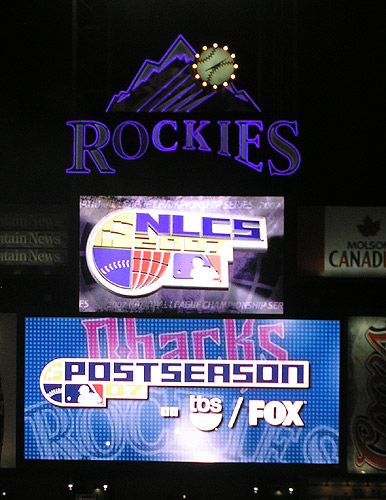
The color guard:
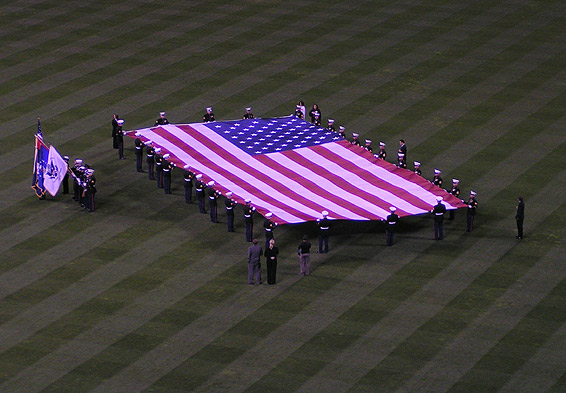
You can't even see the row of purple seats:
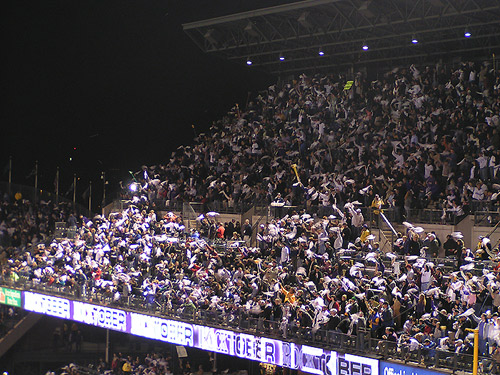
Helton Batting:
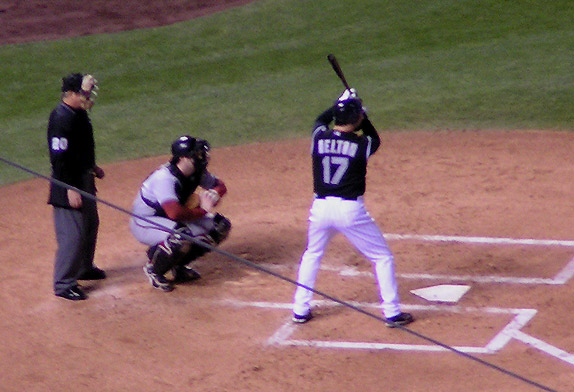
Holliday in mid-homerun swing:
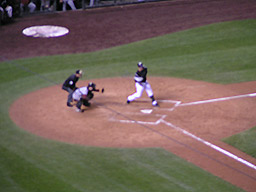
The celebration. I have to say, I liked it better when they felt they could trust the fans to run out and mob the field, also:

Media Time, as they wheel out an oversized pingpong table:
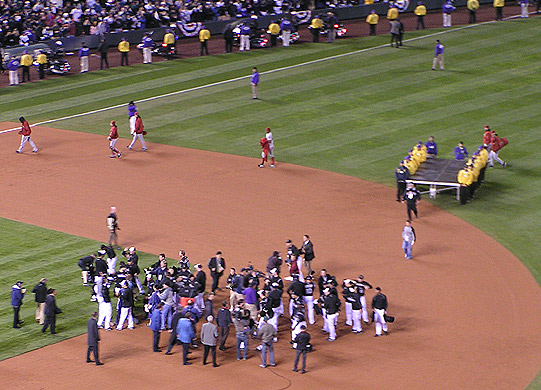
This is what happens when you get hot at just the right time:
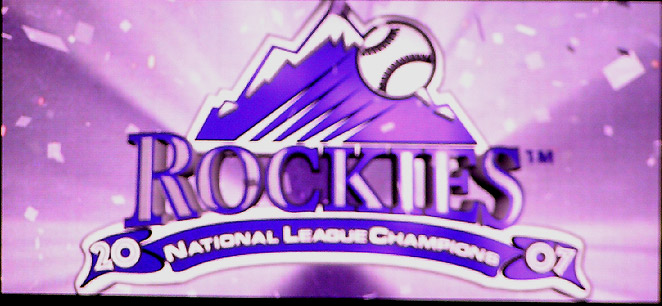
October 15, 2007
Upon Further Review...
...that last posting was way too sour. I just took the opportunity to mention everything about the current MLB experience that I don't like, forgetting to repeat how surprised and grateful we are all to have the chance to watch baseball in October.
As I've mentioned before, I had never been to a professional playoff game of any kind, so aside from bunting and six umpires, I hadn't thought there would be any real divergences other than the atmosphere, or at least hadn't known what ones to expect. My guess is that the Rockies themselves hadn't really expected to be here, either, so they're throwing together what pageantry they can think of, dialing around to other teams. Inexperience has its charms. But for all I know, MLB could have standards too, like the three color guards instead of one. The Rockies as a team are a class act, and while the organization as a whole has been faulted for being cheap, that certainly wasn't on display last night.
Cheering, "from the mountains" during God Bless America is a traditional that appears to have developed from the bottom-up, kind of like Orioles' fans shouting, "O! say does that star-spangled banner yet wave..."
I still think shooting off fireworks during the Star-Spangled Banner is cheesy, though.
October 14, 2007
Game 3
I just got back from Game 3. Whenever you hear someone say something like, "Well, it's 20 degrees, with mixed rain and hail, but nobody here seems to mind one bit," remember that it's said by someone sitting safely in his warm studio. I sure as hell minded.
I would have minded a lot more if they had lost, though. As it was, sitting through an interminable 7th Inning, with multiple songs, multiple base runners, and no runs, was more than enough, thank you.
One thing mercifully missing from this game was the relentless noise from the speakers that makes conversation at regular season games require walkie-talkies between neighboring seats. There was enough of it all right, including the terminally insulting, "Get Loud!!!" accompanied by some indeterminate music with a tremendous bass backbeat. But the music in-between every pitch was missing, as was a fair amount of the player theme music. I can't help but think some of it was a result of the National Television Audience, announced to great enthusiasm at the beginning of the contest.
The fans were funny, as always, booing Barry Bonds on the MLB season highlight reel, and the upper deck trying to start a Wave in the 9th. (A Wave! At a baseball game! In the 21st Century! Next thing you know, they'll be bringing back wooden outfield fences and bleachers, and passing out parasols to the ladies during hot summer days.) I did think the fireworks (rockets, red glare, bombs bursting, &c) during the national anthem was in dubious taste, though.
As for the game, despite the win, the Rockies could easily have lost this game, and lost it in the first inning. Before the D-Backs' home run, they had been hitting Fogg hard, driving the ball all over the park, only right at guys. The Rockies got three double plays in the first three innings, which means Arizona had men all over the bases, too.
For the first time, Holliday, despite his home run, showed visible frustration when he popped out and left men on. Guys, you're facing the best pitching day in and day out every game. Enjoy now, because it's only going to get worse.
It was only win 20 in 21 games for the Rockies, and suddenly, the World Series looks like it may be headed to Colorado. Truly, we are in the End TImes.
October 13, 2007
Marketing Geniuses
I see where the brilliant minds that run baseball decided to start their only playoff game tonight at 8:30 Eastern, with both teams from the Eastern Time Zone. The better the game, the more likely to hold interest late. It's now almost 1:00 AM in the east. The game is going into extra innings, tied 6-6.
I'm not one of these people who thinks "it's all about the kids." When people bring up the kids, it's almost never about the kids. It's about the adults. And asking even adults to stick around until 11:30 for a normal-length game is asking them to wake up on the sofa with an infomercial running, bearily reaching for the remote to click to ESPN News to see who run before stumbling off to bed.
A full stadium, by the way, means less than nothing. Those people spent hundreds of dollars on those tickets. You think they're going to leave?
There may only be one October, but this scheduling is designed for people to say, "Wake me up when it's November."
October 11, 2007
Running the Bases
Second base, graveyard of empires.
OK, it's not exactly Babe Ruth being thrown out to end the 1926 Series, but still. I knew bunting was more or less a lost art, Jeff Cirillo aside. Who knew that timing your slide so that you stopped, you know, on the bag, would be that difficult. I mean, it's not like he's been doing this on a 90 ft. diamond since 6th grade or anything.
As for that other play, the one that prompted the Plague of Plastic Water Bottles? Now, it's perfectly ok to slide in hard to break up a double play. I even remember it being ok to barrel-roll into the base. There's a famous picture of Ty Cobb that looks as though he's just finished doing exactly that. Although Cobb also used to file his spikes to the point where they could substitute for phonograph needles, so on second thought he may not be the best reference here.
What it's not ok to do is to barrel-roll into the base and do your Jack Tatum impersonation. There was a time about 100 years ago, when a baserunner coming home could count on knowing he'd been somewhere. He'd get spiked, held, elbowed, and whatever else wouldn't show a mark. That's why they went and formed the American League.
Now people will say tomorrow that it cost Arizona the game, and they did indeed load the bases after that. But without the play, it's an almost certian double play anyway, which is why the ump could call it the way he did. The call sure didn't help Arizona, though. With a no-call, it's 1st and 3rd with one out. If the rest of the inning plays out the same way, they get two, possibly three runs, and the whole complexion of the game changes the rest of the way.
Man, do I love October.
October 2, 2007
Play-In. Playoff.
On the whole, they'd rather be in Philadelphia.
It may not have technically been a playoff game, but there was bunting (and Kaz Matsui's bad bunting), and there were six umpires (none of whom could see a home run), and it was one-and-done for both teams, so it sure felt like a Game 7.
Somehow, the Rockies, who couldn't hit middle-school middle relief all night, took this year's presumptive Cy Young Award winner, and a Hall of Fame closer, and knocked them around like a couple of rag dolls. Somewhere, Jorge Julio is buying Rolexes for the top half of his team's batting order. And Matt Holliday justified an M-V-P chant that had gone a little hollw after botching a game-tying fly ball to left.
Actually, you can blame me for that one. I don't have access to the office after-hours, so I took the laptop to the game with me. With the Rockies up 6-5 in the top of th 8th, I decided to go ahead and buy tickets for a possible NLDS Game 4 here on Sunday. As I was going through virtual checkout, the Pods hit a game-tying double. I closed the laptop, and only re-opened it after the winning run was recorded. I now have two right-field corner seats for Sunday's game, so if you're in Vegas, your best bet is a 3-game sweep.
A couple of game notes. I haven't actually been to many Rockies games this year, so I hadn't seen Ture-lure-witzki's stance. Let's just say it would make Larry Craig proud. I have no idea how he generates power from there, but evidently he does.
Blown home run call or no, the Rockies got themselves into trouble all by themselves. Their defense - which has been sparkling all year - generated one formal error and three mistakes. Holliday misplayed that fly, but the third-baseman-at-the-time pulled Helton off first with a wild throw, and Tulewitzki bobbled what should have been a relatively easy play at first. If that's nerves, then at least nobody else in the NL has much playoff experience, either.
At the time, I thought manager Clint Hurdle was way too fast with his relievers, running through Fuentes, Affeldt, Corpas, and Buchholz in the space of about two innings. Herges was game, but the quick moves - especially pulling Corpas for a pinch-hitter who flailed away like a pitcher - left Hurdle with Jorge Julio in the 13th. Julio was so wild, you wanted to yell, "Aim at the mascot!" But having survived, he's left with a basically intact bullpen, since nobody went more than warmups.
I did think the intentional walk in the 11th, with one out, was playing with fire. I've never liked intentional walks. Pitchers are trained to find location, and making them throw four straight junk balls just never seems like a good idea. But further, suppose the batter sacrifices the runner to third. There are two out. The next guy needs a hit to bring him home, the same as you need to score the guy from second. And if you're that scared of him, the pitcher's spot was up next. Hurdle had a chance to force Black to either waste a chance or a waste a pitcher, and he passed it up hoping for a ground ball.
These are quibbles, to a degree. The Rockies have played both the Phils and the D-Backs well. And for the moment, we do indeed have Rocktober. When a friend of mine - a Red Sox fan - asked if I had ever seen anything like it, I couldn't resist the obvious. This wasn't Bill Buckner or Bill Mazeroski, or even Kirk Gibson. But it'll do.
September 30, 2007
MLB Arrives in Denver
"What's that," you ask? I see this thing called, "The Rockies" in the NL West standings every day.
Yes, for years, the Rockies have played major league teams, and the games have counted in the standings, much as interleague games count, or the NFL replacement players' games counted in 1988. But the actual product on the field bore the same resemblance to major league baseball as Stephen Sondheim bore to Rogers & Hart. You went for a while, because it seemed like the thing to do. And then you stopped going.
This year promised more of the same until about two weeks ago. The Rockies were destined to play .500 ball, which would be progress. Then, suddenly, they started winning. And then, all at once, the games started counting. In late September.
So here I sit, work to do, watching the Rockies with the sound off and streaming the Brewers and Padres. There's a certain cognitive dissonance in doing that. You have to watch, rather than listen, for the crowd reaction when they post the Padres' score updates on the field on the TV.
Right now, it's 9-4 Brewers in the 7th, but the Rockies and Diamondbacks are in a scoreless tie in the 6th. The Rockies hitters seem to be trying too hard, though, swinging at first pitches, popping balls up, not able to capitalize on the few opportunities they're giving themselves.
(Rockies get a 2-out bases-empty walk in the bottom of the 6th.)
I've never seen a playoff game live.
(Rockies get a run-scoring double to right, scoring the runner from first, with the batter going to 3rd on a fielder's choice, as the 3rd baseman can't handle the throw from the catcher. It's 1-0, Rockies in the bottom of the 6th.)
The closest I came was in 1989 in Baltimore, the "Why Not?" year, much like this year in Colorado. Nobody expected much of that Orioles team, and the record wasn't so great, but they held first place all year until September, and even then it came down to the last weekend of the year. I went to the last Sunday home game, where they lost 2-0 to the Yankees, basically knocking them out of the race. The Orioles fell into a years-long slump, reviving briefly under to reach the playoffs Davey Johnson before Peter "Li'l Steinbrenner" Angelos fired him.
(The Rockies batter can't get down a suicide squeeze bunt, and it thrown out at first. So we go to the top of the 7th with one out.)
I am informed by the Brewers' announcer that the possible one-game playoff between San Diego and Colorado would be played here tomorrow.
(The Brewers' announcer has it in for the Rockies, dissing the Diamondbacks second-stringers who are starting today. Anyone with a bat in his hand is dangerous.)
Should that happen, and a 1-0 lead is paper-thin out here, you can bet I'll be there. I work one block away from the stadium. And a one-game playoff is still a playoff.
In the meantime, nothing's settled. The Brewers are piling it on the Padres, 10-4 now, but the Rockies just issued a 1-out bases-empty walk, and the next pitch almost ended up in Mile High Stadium down the road.
God, I love late-season baseball.
UPDATE: Well, they made it interesting, grabbing a 4-1 lead, and holding on for a 4-3 win. San Diego's coming to town tomorrow, after all. We'll see if they have time to break out the bunting.
April 27, 2006
Why Finance is Like Baseball - II
I read Michael Lewis's Moneyball the other week, and one of the first things that came to mind was a comparison to investing. Moneyball explores the Oakland A's search for better cheap talent through market inefficiencies. They discover these inefficiencies by sifting through massive amounts of data, and by, in effect, playing a different game from everyone else. The look for correlations between statistics and runs - in their case, on-base percentage and slugging.
They also do something really funky. They calculate the value of everything a player does - ever batted ball, every fielding play, every pitch - in terms of how much that play made his team more or less likely to score in that game, and then add them up. Nothing matters but outs and runs. Get enough runs, forstall outs long enough, and wins will follow. That's playing a different game from everyone else.
They are the quant funds of baseball.
Compare them to the Atlanta Braves. Boys not born the last time someone else won the Braves' division were complaining about getting fountain pens last year. They rely on traditional scouting, trying to project what a player can become, looking for them one gem at a time.
The Atlanta Braves are the value investors of baseball.
Compare them both to the Red Sox & the Yankees. These guys have money to burn, they frequently try to buy whatever proven talent is out there, often overpay for it, and often don't keep it very long. They'll break teams apart, change management with glee, raid weaker & poorer teams for their best players.
The Red Sox & Yankees are Carl Icahn and T. Boone Pickens.
The interesting thing is that you can win both ways, and you can make money both ways. And what's more, you can find lots of different types of value, and you can and you can find lots of different quantitative inefficiencies. As part of my research last year, I interviewed three different quant fund managers, and know of a couple others. They each do something different, and they each consistently beat the market. Finally, you can also make a lot of money turning around failing enterprises and buying up juicy bits of your competitors. But it's a lot of work running the business.
April 6, 2006
Streak Snapped
Jimmy Rollins's hitting streak is over at 39 games. What was the 7th-longest hitting streak in major league history was also among the least celebrated. I remember two of the longer ones: Pete Rose's 44-gamer and Paul Molitor's 39-game streak. I remember both getting a lot more attention than this one.
I think there are at least two reasons for this. First, the streak took place over two seasons rather than one. While I'm sure it must have rankled, I saw Rollins calmly discuss how he saw why some people might think that made the streak less interesting, he still believed that the record was the record. Rollins also pointed out ways in which it was harder to start up again in April, both with the weather and with the loss of momentum, but that's special pleading. It's hard either way. The one thing that Rollins had going against him, publicity-wise, was that at the beginning of the year, the teams are still sorting themselves out. Rose's and Molitor's streaks came when the seasons' story lines were already pretty well established.
The other reason is what was called, with regards to Roger Maris, "baseball stature." I think there's a sense that the big records, the ones with emotional attachment, should be broken as part of a great career, or in the case of career stats, as the culmination of one. The people rooting against Maris were entitled, of course, although there's a difference between rooting for a record you love and sending hate mail.
Rollins, according to Baseball Reference, is a fairly average player, with lots of speed, but a better reputation than his performance seems to warrant. He's below the league average most years on both OBP and Slugging, although his runs created is pretty solid these last two years. It's probably been aided by the freakishly large number of triples he hits. In other words, he seems to be a pre-Ripken-era shortstop. There's just no comparing him to DiMaggio at this point in their respective careers (DiMaggio's hit streak also came at age 26). There's also no comparing him to Rose at the point in Rose's career
There's a much closer comparison to Molitor in terms of prominence. Molitor had been an All-Star twice, but had one of the best years of his career in 1987, the year of his hit streak. Strange though this may sound, Milwaukee also was a national stage at that time. He led his team to the 1982 World Series, where he batted .355, an opportunity that Rollins hasn't had yet. And one year (1987?) the team started out something like 35-5, incredibly failing to win the division. He also was consistenly ahead of the league in average, OBP, and SLG. Molitor was already a star, but his best years were still in front of him.
These are probably Rollins's peak years. He's got little but speed, doesn't draw many walks, and doesn't hit for power. Ages 26 and 27 are the peak years for players, anyway, and players with only speed tend to decline quickly.
None of this is necessarily fair, but four or five more games would probably have gotten everyone's attention.
As a side note, while as a kid I remember trying to pick up KMOX (from DC!) to hear Molitor's hit streak, I was able to follow today's game on MLB. There was a time when these were free, on the streaming audio of the local stations. Then MLB apparently realized that they weren't squeezing every penny they could out of their fans, started claiming rights to the broadcasts, and centralized the streaming on their own site. Still, for $15, I can listed to three or four games a night, if I want, and tune in teams that actually have a shot at a winning record, and whose games don't take longer than Wagner's Ring cycle to perform. Not a bad deal.
April 5, 2006
You Don't Say
The New York announcer for the Mets/Nationals game:
Everything else in the American League is either concluded or still going on.
March 17, 2006
Just Arrived
Baseball Between the Numbers: Why Everything You Know About the Game is Wrong. I've been a Bill James fan for a long time, and this sort of thing never ceases to fascinate me. It'll be interesting to see how well it holds up against the baseball blogs.
March 6, 2006
A Stadium of Davids
Sure, the title sounds like a John Kruk at-bat, but if you've ever wanted to be your own Bill James, this is the book for you.
October 27, 2005
Why Baseball is Like Finance
My first year in college, I was introduced to Bill James. He practically invented modern baseball statistical analysis, making up new statistics like Runs Created and Win Shares to measure performance. He created the baseball Pythagorean Theorem relating runs scored/allowed and wins. He quantified mean reversion for teams that showed unusual improvement, and showed how stolen bases are overrated, and explained park effects.
He did this by doing what any good analyst does - asking the right questions, collecting as much data as possible, and then putting it together in inventive and original ways.
Which is also what any good financial analyst should do. Any competent analyst can look up the numbers, harmonize financial statements across competing companies, and compare the existing ratios. Anyone with a decent background can create fairly good spreadsheet models. (This isn't to say it's easy; nothing's easy; only to say that it's part of an analyst's basic skill set.)
But a really good analyst, a creative guy who's trying to push back the frontiers a little, will invent his own stats, invent his own ratios, his own ways of looking at the numbers. Maybe there are ways of describing how a company manages its debt, or what it's raising it's debt to do, that are different from simple debt ratios or capital structures. Maybe there are ways of including other long-term liabilities (read: pensions) into the model. Cash flow statements are still relatively new, but the main ratios to come from them use the overall cash flow number, and Quality of Earnings (how much income is from operating cash flow). There must be other ways of using all those line items.
The great revelation for me, as a programmer who had never really thought much about the nuts and bolts of the system that I earned my living in, was that the line items on the financial statements represented ideas and concepts, not just bookkeeping entries. I'm just starting out, so for me, it's largely a matter of mastering the existing tools. But the fun part, and the part that more analysts ought to be focusing on, is putting those numbers together in new ways, to tease out new information, and to describe businesses - and even whole industries - in new ways.
Otherwise, we're just a batting-average outfit in a OPS world.
October 26, 2005
Congrats to the White Sox, and to the Houston Fans
When the White Sox had to win games, they did. The got out to that fantastic lead, and then played a little over .500 ball. When Cleveland went on a red-hot tear, the press called it "a collapse," and handing the division to the Indians. Chicago never even surrendered the division lead. And then, they went 11-1 in the post-season. They won the games that mattered. Good for them.
The whole 88-year thing seems a little ginned up, mostly because the White Sox weren't around the Series often enough to remind us of it. But it's a big deal in Chicago.
When you see the replay of Jose Uribe following that foul ball into the stands, watch how the Houston fans react. Sure, Uribe's a big guy, but they're all standing above him, and most of them have gloves. If any of them wanted to, they could have caught the ball a la Bartman. With the World Series arguably on the line, they didn't.
October 20, 2005
Why Nobody Loves the White Sox
Since the White Sox haven't won a World Series since before the Red Sox last won (1917, vs. 1918 for Boston), they just assume that they're entitled to the same sympathy and underdog status that the Red Sox and the Cubs get. They just can't understand why 88 years isn't a bigger deal than 86 years.
Here are five reasons why.
1 - Success
The Cubs and the Red Sox have had more success than the White Sox. They've each had more appearances at every postseason level, and with the exception of the current White Sox run of 1sts and 2nds in a diluted division format, they've had them longer. Yes, both teams were miserable for long stretches, too, the Cubs in the 40s, 50s, and 60s, and the Red Sox in the 20s, 50s, and 60s. (From 1922-1932, the Red Sox finished last 9 times; nobody was more relieved to see Connie Mack coming than Boston fans.)
But this was largely after their legends were established. The Cubs won pennant after pennant in the World Series's early years, as did the Bosox. Their failures stood in contrast to their early success. And they've had their chances since. Which leads to...
2 - Heartbreaking Losses
The Bosox lost the World Series in 1946, 1968, 1975, and 1986. All in 7 games. They blew a 14-game lead in 1978. Everyone knows this. The Cubs may not have won since 1908, but they've played Detroit a couple of times, and ran into a couple of Yankees buzz-saws. They were one stupid frat-boy Steve Garvey home run away from a pennant in 1984. They blew a 9-game lead to the Mets in 1969.
The White Sox haven't taken a series to the final game in their entire history. Finding new ways to lose a 7-game series is the stuff of grand opera. Losing 4-2 to the Dodgers or 3-1 to the Orioles is par for a series.
3 - Curses
Look, you trade away Babe Ruth, whom everyone loves, to the Yankees, whom everyone hates, that's baseball mythology. Turning away an Old Man and His Goat is a Stephen King novel at worst, kinda cute at best. You can't win a series after that, and people just marvel at hidden powers.
You throw a series, get your whole team barred for life, destroy the integrity of the game, and force baseball to hand over powers not seen since Sulla to a second-rate judge in order to fix things, well, if you can't win a series, it's justice. No wonder they weren't missed. They were lucky still to be playing.
4 - Poets
The Red Sox get Bart Giamatti. The Cubs get George Will. The White Sox get...um..., yeah, right.
5 - Ballparks
Face it, right up until the moment in 2003 when Bartman interfered with Aaron Bleeping Boone's home run, or whatever, baseball fans were jazzed about a series played in Wrigley and Fenway. And not just because of the age, although that matters, too. Because of the continuity.
Look, nobody liked the old Comisky (once the novelty of fireworks for home runs wore off), and nobody likes the new Comisky. It's called "The Cell," ostensibly after US Cellular, but parks get the names they deserve. And it's not like Luke Appling or Luis Aparicio played there. If you're going to exorcise ghosts (or have them continue to haunt), the ghosts need to be there. The Cell has no ghosts.
Bonus Reason - 88 Years Is Too Long
In 1986, when the Red Sox hadn't won in 68 years, that was accessable. There were Red Sox fans who still could remember their last title. Sixty-eight years is a little less than a normal lifespan, so while Red Sox fans might die without seeing another title, they probably weren't going to die never having seen one. By 2004, when it was 86 years, I had stopped counting. Now, nobody remembered their last title, and nobody had been around for all 86 years of failure. So it was just a number.
Eight-eight's just a bigger number.
I'll probably be rooting for the White Sox against the Astros anyway. I still hold their orange construction-sign-uniform-plagued and Astro-turf-ridden history against them, for one thing. For another, I'm an American League guy. But really, other than that, I couldn't care less if the White Sox had been waiting 100 years for a title.
Hey, 2008's only 3 years away, Cubs fans.
October 5, 2005
It's the Most Wonderful Time of the Year
The Baseball playoffs have started. I love watching playoff baseball, even if this year's Jewish holiday calendar interferes more than I'd like. The whole feel of the game is different, although I agree with Bob Costas that three rounds of playoffs is one too many. (Yes, I know that that means that the Red Sox, Angels, and Marlins wouldn't have made the postseason. Too bad.)
I followed the Orioles as a kid, and celebrated their 1983 Series win, but was really spoiled by the 1985 and 1986 playoffs. Go look them up.
|

Power, Faith, and Fantasy

Six Days of War

An Army of Davids

Learning to Read Midrash

Size Matters

Deals From Hell

A War Like No Other

Winning

A Civil War

Supreme Command

The (Mis)Behavior of Markets

The Wisdom of Crowds

Inventing Money

When Genius Failed

Blink: The Power of Thinking Without Thinking

Back in Action : An American Soldier's Story of Courage, Faith and Fortitude

How Would You Move Mt. Fuji?

Good to Great

Built to Last

Financial Fine Print

The Day the Universe Changed

Blog

The Multiple Identities of the Middle-East

The Case for Democracy

A Better War: The Unexamined Victories and Final Tragedy of America's Last Years in Vietnam

The Italians

Zakhor: Jewish History and Jewish Memory

Beyond the Verse: Talmudic Readings and Lectures

Reading Levinas/Reading Talmud
|








































